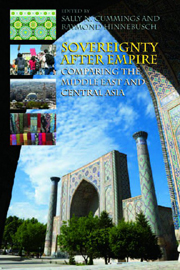Book contents
- Frontmatter
- Contents
- Acknowledgments
- Notes on the Contributors
- 1 Introduction
- SECTION I Histories of Empire and After
- SECTION II Paths to Sovereignty: Views from the Core and Periphery
- 5 Sovereignty in the Ottoman Empire and After
- 6 Mandated Sovereignty? The Role of International Law in the Construction of Arab Statehood during and after Empire
- 7 Reluctant Sovereigns? Central Asian States' Path to Independence
- SECTION III Empire and Domestic Sovereignty
- SECTION IV Empire and Popular Sovereignty
- SECTION V Empire and External Sovereignty
- Bibliography
- Index
7 - Reluctant Sovereigns? Central Asian States' Path to Independence
from SECTION II - Paths to Sovereignty: Views from the Core and Periphery
Published online by Cambridge University Press: 12 September 2012
- Frontmatter
- Contents
- Acknowledgments
- Notes on the Contributors
- 1 Introduction
- SECTION I Histories of Empire and After
- SECTION II Paths to Sovereignty: Views from the Core and Periphery
- 5 Sovereignty in the Ottoman Empire and After
- 6 Mandated Sovereignty? The Role of International Law in the Construction of Arab Statehood during and after Empire
- 7 Reluctant Sovereigns? Central Asian States' Path to Independence
- SECTION III Empire and Domestic Sovereignty
- SECTION IV Empire and Popular Sovereignty
- SECTION V Empire and External Sovereignty
- Bibliography
- Index
Summary
We do not have enough energy for the peripheries, neither economical, nor spiritual energy. We do not have enough energy for the Empire! – and there is no need, and let it fall from our shoulders: it is exhausting, it is draining us, and accelerates our demise … So, we need to announce the definite right to full secession of those twelve republics – urgently and firmly. And should some of them hesitate whether they ought to secede, we must with the same resolve announce OUR secession from them.
Aleksandr SolzhenitsinWe were in opposition but we were constructive. I myself view the collapse of the Soviet Union as a tragedy for Kazakhstan … Gorbachev wanted to draft a more equal Union Treaty. But then Yeltsin wanted to remove Gorbachev. In order to achieve that, he exploded the whole Union. We say that it is not worth burning the whole fur coat to kill one flea. But that is exactly what Yeltsin did.
Olzhas SuleymanovSovereignty was a useful word for everybody … It could make the most cautious politicians sound radical, which was useful for the Communists, in order to please the people; and it made the radical politicians sound moderate, which was useful for the implicitly pro-independence movements, who did not yet want to be out in the open. Nobody, after all, could seriously quarrel with the idea of sovereignty.
- Type
- Chapter
- Information
- Sovereignty after EmpireComparing the Middle East and Central Asia, pp. 127 - 154Publisher: Edinburgh University PressPrint publication year: 2011



